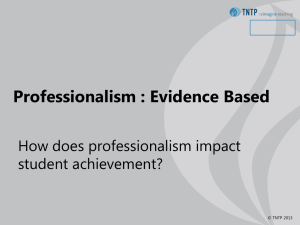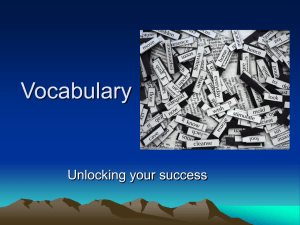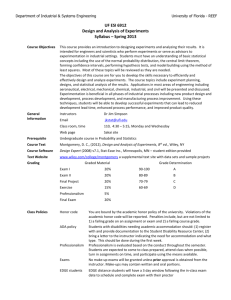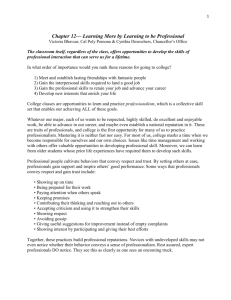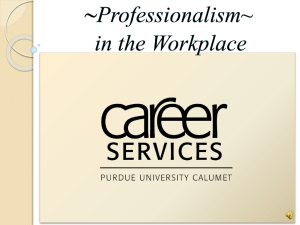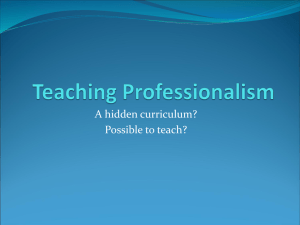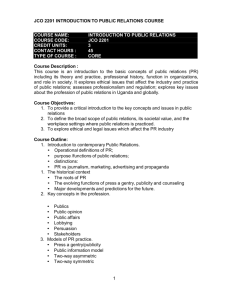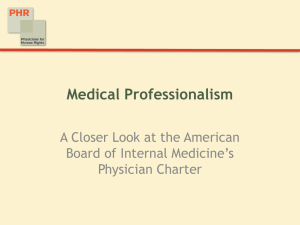On the Definition of Professionals in Staff Development Programmes
advertisement
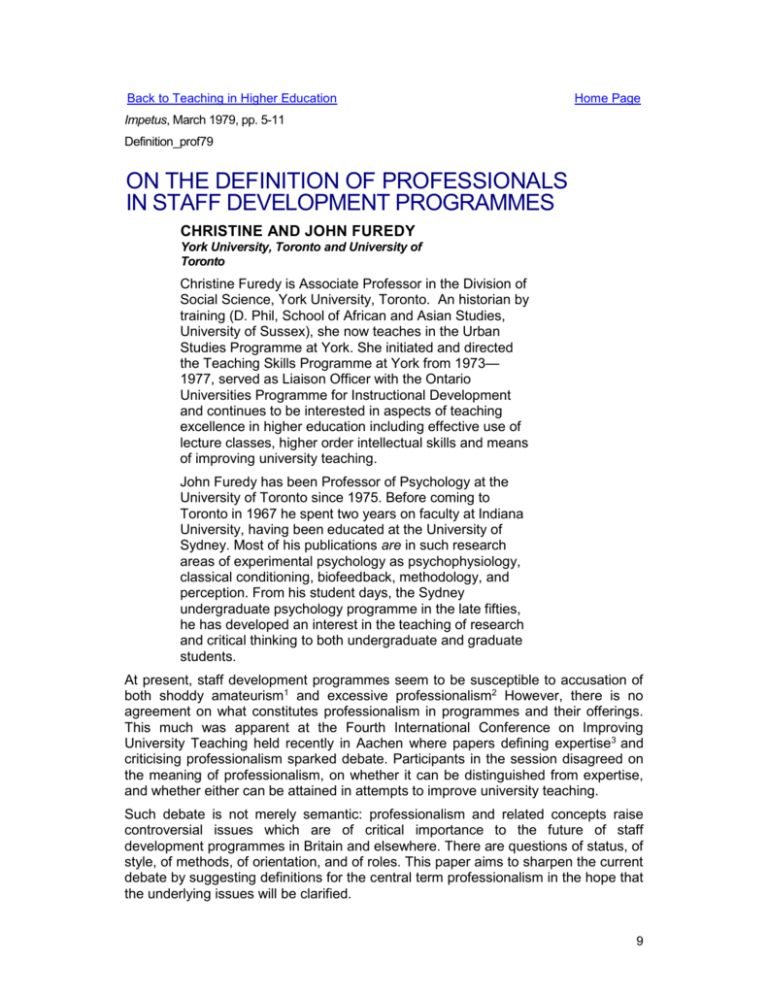
Back to Teaching in Higher Education Home Page Impetus, March 1979, pp. 5-11 Definition_prof79 ON THE DEFINITION OF PROFESSIONALS IN STAFF DEVELOPMENT PROGRAMMES CHRISTINE AND JOHN FUREDY York University, Toronto and University of Toronto Christine Furedy is Associate Professor in the Division of Social Science, York University, Toronto. An historian by training (D. Phil, School of African and Asian Studies, University of Sussex), she now teaches in the Urban Studies Programme at York. She initiated and directed the Teaching Skills Programme at York from 1973— 1977, served as Liaison Officer with the Ontario Universities Programme for Instructional Development and continues to be interested in aspects of teaching excellence in higher education including effective use of lecture classes, higher order intellectual skills and means of improving university teaching. John Furedy has been Professor of Psychology at the University of Toronto since 1975. Before coming to Toronto in 1967 he spent two years on faculty at Indiana University, having been educated at the University of Sydney. Most of his publications are in such research areas of experimental psychology as psychophysiology, classical conditioning, biofeedback, methodology, and perception. From his student days, the Sydney undergraduate psychology programme in the late fifties, he has developed an interest in the teaching of research and critical thinking to both undergraduate and graduate students. At present, staff development programmes seem to be susceptible to accusation of both shoddy amateurism1 and excessive professionalism2 However, there is no agreement on what constitutes professionalism in programmes and their offerings. This much was apparent at the Fourth International Conference on Improving University Teaching held recently in Aachen where papers defining expertise3 and criticising professionalism sparked debate. Participants in the session disagreed on the meaning of professionalism, on whether it can be distinguished from expertise, and whether either can be attained in attempts to improve university teaching. Such debate is not merely semantic: professionalism and related concepts raise controversial issues which are of critical importance to the future of staff development programmes in Britain and elsewhere. There are questions of status, of style, of methods, of orientation, and of roles. This paper aims to sharpen the current debate by suggesting definitions for the central term professionalism in the hope that the underlying issues will be clarified. 9 In many fields of modern knowledge, the concepts of 'expert' and 'professional' are so closely related as to hardly warrant distinction. An expert is one who, possessing a special knowledge of a field, is regarded as an authority. Those who apply such expertise to a calling of public status are then regarded as professionals. Professionalism, then, is the behaviour of experts in the conduct of their calling or profession. This common linking of professionalism and expertise might engender the assumption that where there is no expertise, there can be no professionalism and, further, that where there is no clearly defined, generally accepted body of knowledge for a field, there can be no professionals or experts. These assumptions underlay one position adopted at the IUT Conference session: that since the field of higher education has not, as yet, delineated a body of knowledge applicable to the improvement of university teaching (and perhaps never will), it is presumptious for the staff of instructional development centres to assume the role of experts and act like professionals. There is, however, another way in which the term professional is sometimes used which may be applied here and would enable us to validly refer to professionalism without implying that there is a body of instructional development knowledge, familiarity with which distinguishes the expert from the non-expert or 'client'. One may speak, for instance, of an amateur tennis player playing 'like a professional'. Here the reference is not to some difference between amateur and professional status nor to the fact that a lesser player may on occasion display the skill of a better one. It may refer to the style that we expect of a professional player. The mark of the professional approach is the ability to direct behaviour consistently towards clearly defined goals. The amateur tennis player who has a professional style is able to play consistently, with forethought and with appropriate strategy. It is the mark of a professional that he (or she) knows how to make the best of what he's got. If we apply this sense of professionalism to the case of staff development, we may say that 'the professional approach' consists in possessing and utilizing the skill to maximize the opportunities for improvement in teaching or learning in higher education:4 For any specific situation, the professional approach requires clearly defined goals and the ability to select and apply appropriate methods for achieving them, even though the goals and methods cannot be derived from an accepted body of knowledge in which the staff developer is recognized as an expert (but may in fact be derived from past experience, common sense, or even intuition). This secondary sense of professionalism as a professional approach or style which disavers the authority-claiming status of the expert is, we think, the only sense in which one can legitimately speak of professionalism in staff development. Perhaps one should make a distinction between professionalism and 'pseudoprofessionalism', the latter being a set of behaviours based on a spurious claim to expertise and professional status. At present, pseudo-professionalism is more in evidence in staff development programmes than professionalism, and it is this pseudo-professionalism, with its paraphernalia of jargon, procedures and consultantclient roles, which we criticized at the IUT Conference. 10 Unfortunately, the drive for secure and legitimate status for staff development programmes in institutions of higher education (made urgent by the threat of cutbacks) is forcing many programmes along the road to pseudo-professionalism. This route will lead them away from the majority of faculty members and the needs of the student body. As Susan Sayer argues in the June 1978 issue of Impetus, a healthy scepticism is to be expected on the part of faculty towards efforts in professional development.5 If the staff of university centres counter this scepticism by retreating into the roles of experts, regarding their colleagues as 'clients' whose defects (neuroses?) must be diagnosed and treated, healthy scepticism will soon turn into active alienation, or at best, indifference. This will be particularly so when programmes are advertised as professional undertakings, and then conducted amateurishly. This was the basis for the reaction of the ‘New Lecturer’ to the induction course referred to in the same issue of Impetus: ‘the shoddy, ham-fisted, hypocritical (emphasis ours) nature of much of this three-day course represented an almost complete waste of my time’6 Pseudo-professionalism can be avoided if those who run faculty development programmes acknowledge their lack of expertise and adopt a more humble and realistic role vis a vis their colleagues. They must recognise that each faculty member has potential contributions to make to excellence in education and must seek the means of maximizing this potential. As the first author suggested at the Conference, the promotion of self-help and mutual aid among teachers is one such means. The ultimate goal is that each faculty member should become professional as a teacher. Then, perhaps, the roles of specialized staff developers and the dilemma of professionalism may be eliminated altogether. REFERENCES 1. NEW LECTURER (1978). ‘A Cautionary Tale?’, Impetus 9, 25 - 26. 2. FUREDY, C (1978). ‘Self-help and Mutual Aid: Countervailing Forces to Excessive Professionalism in Instructional Development Programmes’. Papers of Fourth International Conference on Improving University Teaching (Aachen 1978), 1526 - 1531. 3. SWAIN, R. ‘Towards A Definition of Expertise in the Field of Instructional Development’, ibid, 1532 - 1541. 4. This definition was suggested to us by Kiff Matheson's remark at the IUT Conference that ‘you don't have to be an expert to be professional’, and that 'professionalism refers to maximizing the potentialities of a situation'. 5. SAYER, S. (1978). ‘Will the Real Truth Stand Up?’ Impetus 9, 33. 6. Ibid. 26. CORRESPONDENCE Professor John Furedy, Department of Psychology, University of Toronto, Toronto, Canada, M5S 1A1. 11
